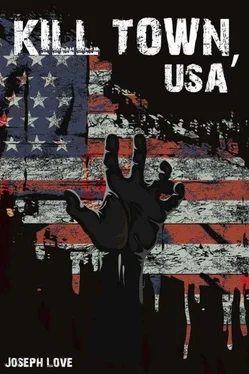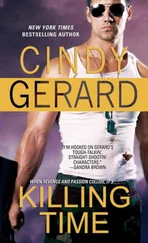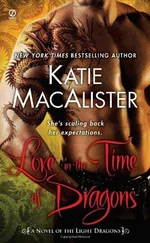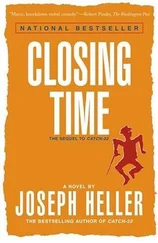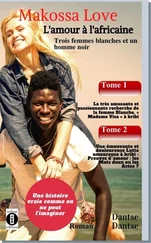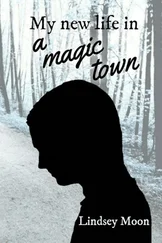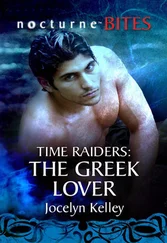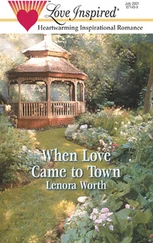The convoy stopped in front of the mini-mart. The air brakes barked. The rest of the vehicles were tankers, a dump truck, and two army trucks.
We watched as men climbed out of the trucks and swarmed the gas station. Two men removed the fuel tank covers and dropped hoses in the wells. Another man took an axe to the lock on the propane bin, and a crew of five smashed the market window and disappeared inside. Two men stood guard with assault rifles tucked against their bellies. They just kicked around in the snow. Then, the whole roadside circus was packed up. The looters hopped back in the vehicles. The plow lurched forward. The men with assault rifles were the last to get in their trucks. Diesel exhaust dirtied the air. The trucks were gone. Fast as that.
The currency of the apocalypse is coffee and cigarettes and lottery tickets. As long as there is hope for the future, men will kill for lottery tickets.
The shelves of the mini-mart were torn apart and stripped clean. On the floor, a few items remained. Want-ads, cold Major Meat hot dogs from the rotisserie, and a dented can of Foster’s.
Audrey sat on the floor with a handful of trampled snack cakes. I sat next to her and opened the dented beer. The foam slid down my hand. Next to candy bars, beer is the best thing for survival.
I finished the beer quickly and tossed the can over a toppled display.
“A tiny militia with plows and assault rifles,” I kicked a bent-up shelf. “What’s wrong with you people around here?”
“Go home and you’ll be in the same situation.” She handed me a cupcake.
She was probably right. I unwrapped the cupcake but didn’t feel like eating. I handed it back to her.
Under the metal shelf I noticed something shiny, white and red. I leaned forward and flicked my fingers at it. Unfiltered Major Blends kicked under the shelf by a highway pirate. I held the cigarettes flat in my palm. Eagerly, we lifted shelves but found little else. Canned soup and sunflower seeds and a pouch of jerky.
We left the mini-mart, splitting the jerky and following the plowed road. We came to Gochie Ford Farm Road. It was blocked by a wall of snow thrown aside by the plow. We climbed over the mound and took the road toward a column of gray smoke over the bony treetops.
A quarter mile down Gochie Ford road, we heard a gunshot. Audrey and I ducked into a ditch and hid in the snow. I spread out flat and raised the Winchester. I scanned the sky, the woods, and the road in a Z-pattern. I felt Audrey shaking, but I’d forgotten what fear was like. I’d forgotten what cold was. I told it all to shut up. To carry on. To survive.
Scanning the woods, I saw the hunter. He was leaned against a tree aiming near us, but I could tell he didn’t know where we were.
I fired at the tree. Splinters exploded into the hunter’s face. He shot blindly and I ducked. Snow scattered over our heads. When the shooting stopped, I took aim again. I followed him as he moved cautiously over logs and took cover behind a large chestnut oak. I shot the oak twice to let him know I was tracking him.
“I think I hear him yelling,” Audrey’s voice was louder than the rifle. I blinked. The tunnel disappeared. My ears rang.
“Just leave us be,” he shouted. His voice was hoarse. “Take what you want, but leave us alone.”
Bolstered by his fear, I stood up from the ditch and crossed the road into the woods. I stopped at the chestnut oak, grabbed the muzzle of his rifle, and aimed it at the top of the tree.
“We don’t want anything,” I said. “What do you want?”
He was a seventy year-old man with no teeth and a .247 deer rifle, a massive scope mounted to the top. He was silent.
I took out the cigarettes and tore off the cellophane. “You want one?” I offered him the pack. He took a cigarette, propped it on his lip, and eyed me as he dug a silver Zippo from the breast pocket of his coveralls. He held out the lighter in his liver-spotted hand. I took it and lit my own. I put the lighter back in his pocket.
He took a long drag. The ash plopped in the snow. He pointed behind me. “Who’s the lady?”
I turned. Audrey stood in the middle of the road holding her arms tight across her chest.
“That’s Audrey. I’m Jack.”
He gave me his hand. “Sewell.” He squeezed hard.
We followed Sewell into the woods. He gracefully stepped over fallen trees, stumps, tangles of roots, and dead shrubs. It felt safe to follow him. Safe to talk to him.
We came to his small house after a fifteen-minute jaunt. It was clad in unpainted board and batten siding. It had a porch, a raw patch of mud for a yard, and a stack of firewood around the perimeter. On the porch he had a wood rocker with several swatches of leather stapled to the seat.
“I’ll bring you something to eat. Just wait here.”
We sat. And waited. After several minutes, Sewell stomped onto the porch with two metal plates in hand.
“Those are just lard biscuits. This coffee’s three-times reheated and cut with chicory. If you don’t like it, I don’t blame you.”
We gorged ourselves on dry biscuits and weak coffee.
He sat in the rocking chair listlessly turning his coffee cup between his legs.
“It ain’t worth getting in them trucks. Wherever they take you, I don’t want to know. And I don’t want to go.”
“Trucks?”
“Sure, they just pile people in trucks and haul them away. They said I had a day to get my effects packed. To wait for the trucks at the gas station. I ain’t waiting at no gas station in the cold. Why don’t they let me be?”
I shook my head. Audrey stuffed a biscuit in her mouth.
“You know what all the fuss is about, I guess.”
“Yeah,” Audrey said softly.
“Why don’t you come inside?”
Audrey and I followed Sewell into his house. Several crayon pictures were tacked to the wall. A stained and saggy couch was in the den. In the kitchen, a wood stove burned bright orange. He stopped at a door next to the kitchen and sighed. Then, he turned the handle and bumped the door with his shoulder.
“It’s my wife,” he said.
From the doorway, we stared at a heavy woman with her arms tied by leather reins to the bed, her face pale and stained with blood. In fact, the whole room looked to have been sprayed with blood—streaked on the floor, puddled near a washbasin, and spattered across the wall and window. The front of her nightgown clung to her skin. But she writhed. She was alive. She twisted and contorted her body in the restraints. There was no noise except the rustling of the sheets. Her eyes open and lifeless, she must have turned several days ago. I couldn’t imagine the struggle to get her tied to the bed.
“She was ill a few days before she come out the room with a nosebleed. Worst I ever seen. When I tried to wipe it for her she bit me. Like I wasn’t—like she didn’t know me from anything.” Sewell unzipped his jumpsuit and revealed the wide bite mark on his shoulder. It had partially scabbed over and was deeply bruised. It was the color of eggplant. “That was two days ago. Seems by what I heard on the radio I ought to be like her now. But I’m still standing. Ain’t I standing?”
Audrey withdrew from the room, holding her hands over her mouth and nose. I was drawn to it. To the sunken face, the gaping mouth. The incessant rustle. The stench. “You’re standing,” Audrey mumbled.
“Once I got Lena off my shoulder, I outrun her all through the house. Even led her back into the room. Just can’t let them get close enough to, you know,” he chomped his gums.
“You’re just hiding out?”
He slammed the bedroom door. “I ain’t hiding. I’m waiting. Either I’m gonna turn into one of them, or I’m going to kill as many yahoos as it takes to keep my wife from getting a bullet right here.” He tapped his forehead. “They overrun the police, you know.”
Читать дальше
